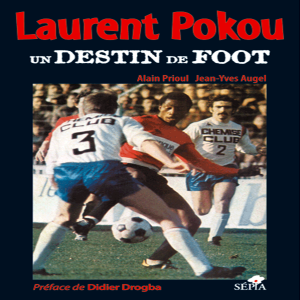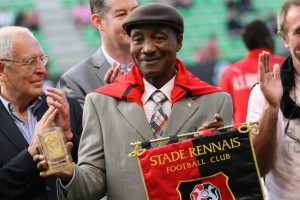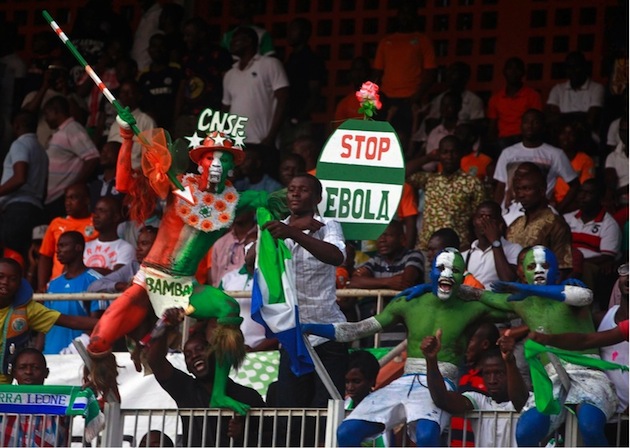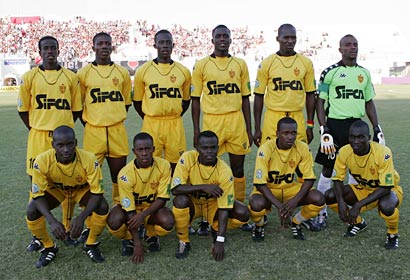Laurent N’Dri Pokou died on November 13, 2016, after a long illness. He was 69 years old. Pokou in the 1970s symbolized the success of postcolonial African football and, like his fellow Ivorian, Didier Drogba, many years later, captured the imagination of an entire generation of Africans.
Pokou was born on August 8, 1947, in Abidjan, Ivory Coast. Growing up in a working-class family, his father worked as a railway company office clerk, football was everywhere. He was first spotted in neighborhood matches by a talent scout from ASEC Mimosas, one of Abidjan’s two powerhouse clubs (the other being Africa Sports).
ASEC quickly signed Pokou and deemed him so valuable that when the Pokou family relocated to the northern city of Bouaké in 1962, the club sent for the youngster and managed to convince his family to allow Laurent to return to Abidjan. Once back with Mimosas, Pokou sharpened his skills and transformed into an archetypal goalscorer: mobile, opportunistic, a fine dribbler, and clinical finisher. It was no surprise that he earned his first call up to Ivory Coast’s national team—known as the Elephants—just in time for the 1968 African Cup of Nations in Ethiopia.
In the semifinal in Asmara (then part of Ethiopia), 21-year-old Pokou netted twice in Ivory Coast’s 4-3 extra time loss to Ghana. He also scored the only goal in a 1-0 win over Ethiopia in the third-place final. Pokou’s six goals meant he was crowned top scorer of the continental showcase.
Two years later, at the African Cup of Nations in Sudan, Pokou confirmed his status as one of the most prolific African strikers of his time. His five goals in a 6-1 rout of Ethiopia put the world on notice. The Elephants reached the semifinals, but once again lost to Ghana’s Black Stars in extra time. Pokou’s eight goals made him the tournament’s top scorer for a second consecutive time and his fourteen goals set a career scoring record for the African Cup of Nations. (Twenty-six years later, Samuel Eto’o of Cameroon finally broke it.)
Unfortunately, in February 1971 Pokou suffered a terrible knee injury during a typically combative ASEC vs. Africa Sports derby. After an operation in France and seven months of diligent rehabilitation, he returned to the pitch.
 Meanwhile, according to the French journalist Alain Prioul, author of a biography of Pokou, the Ivorian President Félix Houphouët-Boigny had been preventing a number of overseas clubs from securing Pokou’s services. Finally, in December 1973 the president dropped his opposition to a transfer. ASEC, having won two league titles in a row, sold Pokou to French club Stade Rennaise (aka Rennes).
Meanwhile, according to the French journalist Alain Prioul, author of a biography of Pokou, the Ivorian President Félix Houphouët-Boigny had been preventing a number of overseas clubs from securing Pokou’s services. Finally, in December 1973 the president dropped his opposition to a transfer. ASEC, having won two league titles in a row, sold Pokou to French club Stade Rennaise (aka Rennes).
As soon as he arrived in Brittany, the Ivorian striker began to deliver. Playing only the second half of the 1973/74 season, he scored seven goals in thirteen matches. The following season, Pokou increased his goal total to fourteen, but Rennes were relegated to the second division.
In 1975/76, he was having a brilliant year with seventeen goals in just twelve matches when he suffered another serious knee injury. After an operation and rehabilitation, he returned to the starting side and contributed six goals in the final stretch of the season.
In 1976/77 Pokou transferred to Nancy where he played alongside future three-time Ballon d’Or winner, Michel Platini. But bad luck struck again: another knee injury! This latest setback sharply curtailed his playing time over two physically and emotionally painful seasons. Pokou decided to return to Rennes for the 1978/79 season, even if that meant playing in the second division. His injury-plagued career in France ended on a sour note: he assaulted a referee on the pitch and received an eighteen-month suspension.
 Pokou returned home to ASEC Abidjan in 1980. He earned two more caps for Ivory Coast at the 1980 African Cup of Nations before retiring. After hanging up his boots, Pokou spent many years as a youth development coach for the Ivorian Football Federation (FIF) and also served as a FIFA Ambassador.
Pokou returned home to ASEC Abidjan in 1980. He earned two more caps for Ivory Coast at the 1980 African Cup of Nations before retiring. After hanging up his boots, Pokou spent many years as a youth development coach for the Ivorian Football Federation (FIF) and also served as a FIFA Ambassador.
Long before Didier Drogba became a household name, another talented, though distinctly less fortunate, Ivorian named Laurent Pokou did much to strengthen African football’s self-confidence and to legitimize the continent’s players status as big-time stars in the global game.
Tag: Ivory Coast

Spectators went beyond the usual gamesmanship at Sierra Leone’s practice in Yaoundé, Cameroon: chants of “Ebola, Ebola” rained on the visitors. “You feel humiliated, like garbage, and you want to punch someone,” said John Trye, a reserve goalkeeper, speaking to Jeré Longman of The New York Times (click here to read the article).
Two months ago, Sierra Leone had reached number 50 in FIFA’s world ranking–an excellent result for a country ranked 183rd in the Human Development Index. Coached by Johnny McKinstry, an ambitious 29-year-old from Belfast, the team seemed poised to qualify for the 2015 African Nations Cup before the catastrophic Ebola outbreak in West Africa.
The Confederation of African Football decreed that Sierra Leone’s Nations Cup home qualifiers had to be played outside the country. When the team journeyed to Lubumbashi, Democratic Republic of Congo, to play a “home” match against the DRC, midfielder Khalifa Jabbie reported that “they treated us like aliens.” In Abidjan, the Ivory Coast players opted for fist-bumps with their opponents instead of shaking hands; fans in the stands taunted the visitors with “Stop Ebola” signs and insulting chants (see photo above).
Already facing stiff competition in a qualifying group that includes Ivory Coast and Cameroon, the itinerant Sierra Leoneans lost matches and became demoralized. “The players tried their very best but sometimes what the mind’s willing to do, the body simply can’t anymore,” said their Irish coach. Making matters worse, a couple of weeks before Sierra Leone’s away match in Cameroon, McKinstry was fired with a curt email from the sports ministry, which then fought publicly with the country’s Football Association over the selection of his successor.
While Sierra Leonans have much more serious matters to deal with than sport, the stigma and fear associated with Ebola is also denying emotional solace to a nation generously endowed with football passion and patriotism. As their new coach, Atto Mensah, put it, “This is the only way we can make people happy. We owe them joy.”
World Cup Music: “Afri Can”
An antidote to Shakira and Pitbull!
“Afri Can” is a charity single by Replay GH, a Ghana-based group featuring Zed Ay Kay (Replay GH), Fuji, Farid, and Gustav. It brings together influence from the five African countries that have qualified for the Brazil 2014 World Cup: Ghana, Nigeria, Cameroon, Algeria, and Ivory Coast.
According to the artists, “the different influences, and styles are seamlessly woven together to produce a modern Afro Beats song for the enjoyment of all football and music fans.” To find out more about Afri Can, visit: http://www.outofafricacampaign.com/afri-can/
Drogba: The Peacemaker
Omdurman, Sudan, October 8, 2005: moments after Ivory Coast secured qualification to the World Cup finals for the first time, Didier Drogba extemporaneously transformed himself into a peacemaker. His country at the time was torn apart by a civil war between the Muslim-dominated rebel-held north and the mainly Christian south controlled by President Laurent Gbagbo’s government. Surrounded by joyous teammates in the dressing room, Drogba took the microphone and knelt in front of the television cameras. “We have proved that all Ivorians can live together,” he said, “and we can unite with the same objectives. Please, put down your weapons!”
The dressing room scene provides the emotional spark and narrative hook in “Didier Drogba and the Ivorian Civil War,” the riveting first episode of “Football Rebels,” a five-part documentary that began this week on Al Jazeera English. (Watch it here.) “It was just something I did instinctively,” the Ivorian striker would later tell Alex Hayes of The Telegraph in a 2007 interview. “All the players hated what was happening to our country, and reaching the World Cup was the perfect emotional wave on which to ride.”
The Al Jazeera documentary film reveals the little-known story of how Drogba played a key role in getting the national team, The Elephants, to play a 2008 African Nations Cup qualifier against Madagascar in Bouaké in the rebel heartland. Ivory Coast won 3-0, triggering a much needed sense of patriotic pride, national unity, and peace. (Highlights below.)
Presented by former Manchester United star Eric Cantona, “Football Rebels” focuses on players “whose social conscience led them to use their fame and influence to challenge unjust regimes, join opposition movements and lead the fight for democracy and human rights in their countries.” The next episode features another brilliant African player: Rachid Mekhloufi, who left the 1958 French World Cup team to join the FLN team aiding the cause of Algerian independence.
Interview with Yaya Touré
With the African Nations Cup about to kick off this weekend in Equatorial Guinea and Gabon, it’s time to put the spotlight on Yaya Touré, the Ivorian international and Man City midfielder. In this part of a longer interview produced by his new endorser — Puma, an expanding commercial force in African football — the best-paid player in the English Premier League reflects on growing up in Ivory Coast, learning the game in Bouake, and then moving to big-time football in Abidjan.
Thanks to Tom McCabe for telling me about this interview.

An African club is the first to enter into a formal partnership with the Professional Football Players Observatory in Switzerland. ASEC MIMOSAS of Abidjan (Ivory Coast) — a powerhouse of West Africa and past winner of the CAF Champions League — will work with the PFPO to identify leagues and clubs that offer the best career opportunities for young Ivorians trained at ASEC’s well-known MimoSifcom Academy. According to PFPO, Ivory Coast supplies the largest number of players to Europe’s Big 5 leagues. Is this latest collaboration a mutually beneficial deal or a form of neo-colonialism?